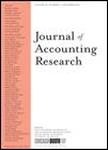-
作者:Garfinkel, JA; Sokobin, J
作者单位:University of Iowa
摘要:This paper examines the relationship between post-earnings announcement returns and different measures of volume at the earnings date. We find that post-event returns are strictly increasing in the component of volume that is unexplained by prior trading activity. We interpret unexplained volume as an indicator of opinion divergence among investors and conclude that post-event returns are increasing in ex ante opinion divergence. Our evidence is consistent with Varian [1985], who suggests that...
-
作者:Livnat, J; Mendenhall, RR
作者单位:New York University; University of Notre Dame
摘要:Post-earnings announcement drift is the tendency for a stock's cumulative abnormal returns to drift in the direction of an earnings surprise for several weeks following an earnings announcement. We show that the drift is significantly larger when defining the earnings surprise using analysts' forecasts and actual earnings from I/B/E/S than when using a time series model based on Compustat earnings data. Neither Compustat's policy of restating earnings nor the inclusion of special items in repo...
-
作者:Baldenius, T; Reichelstein, S
作者单位:Columbia University; Stanford University
摘要:Multidivisional firms frequently rely on external market prices in order to value internal transactions across profit centers. This paper examines market-based transfer pricing when an upstream division has monopoly power in selling a proprietary component both to a downstream division within the same firm and to external customers. When internal transfers are valued at the prevailing market price, the resulting transactions are distorted by double marginalization. The imposition of intracompa...
-
作者:Erickson, M; Hanlon, M; Maydew, EL
作者单位:University of Chicago; University of Michigan System; University of Michigan; University of North Carolina; University of North Carolina Chapel Hill
摘要:We compare executive equity incentives of firms accused of accounting fraud by the Securities and Exchange Commission (SEC) during the period 1996-2003 with two samples of firms not accused of fraud. We measure equity incentives in a variety of ways and employ a battery of empirical tests. We find no consistent evidence that executive equity incentives are associated with fraud. These results stand in contrast to assertions by policy makers that incentives from stock-based compensation and the...


